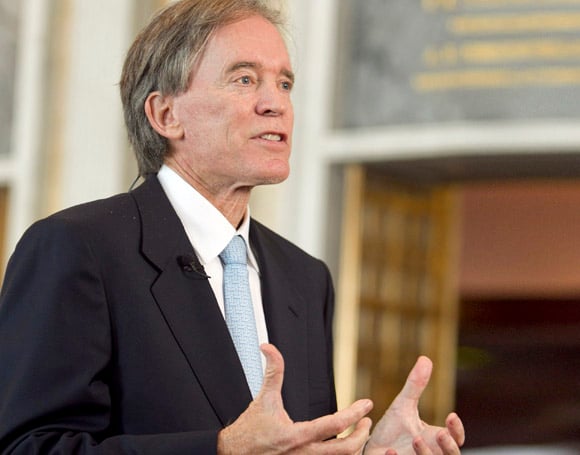Little payback for keeping Uncle Sam in cash; specter of inflation an added bonus
Pacific Investment Management Co.'s Bill Gross said investors aren't being compensated enough for owning U.S. Treasuries after he eliminated government-related debt from his flagship fund last month.
“We're being under-rewarded at this point in time,” Gross, manager of the world's biggest bond fund, said today on Bloomberg Television's “InBusiness with Margaret Brennan.” “A saver should be rewarded for the liquidity they are providing and the risk they are accepting relative to inflation.”
Treasuries are less valuable compared with other assets as the Federal Reserve finishes a round of bond purchases to flood the economy with cash and keeps it target rate for overnight loans between banks a record low range of zero to 0.25 percent, Gross said. If U.S. nominal gross domestic product increases at the 4 percent to 5 percent pace that the Fed expects, Gross said, 10-year notes should yield about 4 percent.
“There are better choices than Treasuries,” he said. “It is simply a reflection of the value of Treasuries relative to other sovereigns or corporate bonds or other issues in the marketplace.”
Treasuries returned 5.9 percent in 2010, according to Bank of America Merrill Lynch Indexes. After slumping 2.7 percent in the fourth quarter, the securities have gained 0.1 percent this year. The yield on the 10-year note climbed four basis points today to 3.40 percent.
Gross last month eliminated government-related debt from Pimco's $237 billion Total Return Fund, which last held zero government-related debt in January 2009. Gross had cut the holdings to 12 percent of assets in January, according to the Newport Beach, California-based company's website. The fund's net cash-and-equivalent position surged from 5 percent to 23 percent in February, the highest since May 2008.
While the U.S. will retain its AAA credit rating for some time, yields on Treasuries are about 1.50 percentage points lower than they normally are, Gross said.
Pimco is starting a new version of the Pimco Total Return Fund that will rely less on derivatives and leverage, two of the tools he used to build it into the world's largest mutual fund.
The new fund, identified as Pimco Total Return Fund IV in a February regulatory filing that details the changes, will forgo high-yield debt, borrowing to create leverage, and investing in options. It will serve as an alternative to, rather than a replacement for Pimco Total Return. Gross declined to comment today on the new fund, citing regulatory restrictions.
Gross set up two other versions of his flagship fund in 1991. Pimco Total Return II is barred from investing in high- yield bonds while Pimco Total Return III is a socially conscious fund that avoids investing in industries such as tobacco, gaming and spirits. Apart from those limitations, their terms are identical to those of the initial Total Return Fund, including the ability to make unlimited investments in derivatives, subject to applicable securities laws and any caveats in their governing documents.
The Total Return Fund has returned 7.43 percent in the past year, beating 84 percent of its peers, according to data compiled by Bloomberg. It gained 1.86 percent over the past month.
Pimco's U.S. government-related debt category can include conventional and inflation-linked Treasuries, agency debt, interest-rate derivatives, Treasury futures and options and bank debt backed by the Federal Deposit Insurance Corp., according to the company's website. The fund can have a so-called negative position by using derivatives, futures or by shorting.
Derivatives are financial obligations whose value is derived from an underlying asset. Futures are agreements to buy or sell assets at a later specific price and date. Shorting is borrowing and selling an asset in anticipation of making a profit by buying it back after its price has fallen.
Pimco, a unit of the Munich-based insurer Allianz SE, managed $1.24 trillion of assets as of December.
--Bloomberg News--







